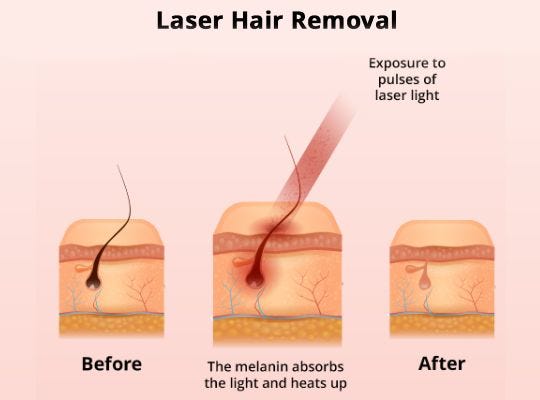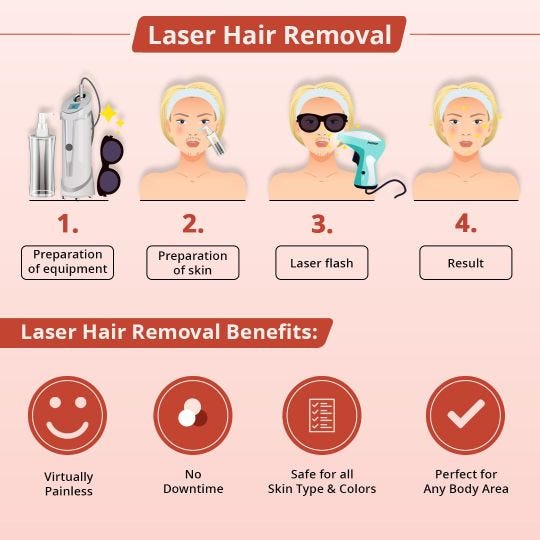
we will delve into the science behind laser hair removal and its potential association with cancer. References to create this blog have been taken from a dermatologist at Neya Dermatology & Aesthetics, a skin clinic popular for laser hair removal in Hyderabad.
Laser hair removal has gained popularity as a safe and effective method to achieve long-term hair reduction. Meanwhile, concerns about the safety of this procedure, particularly regarding the potential risk of cancer, have surfaced in recent years.

In this blog, we will delve into the science behind laser hair removal and its potential association with cancer. References to create this blog have been taken from a dermatologist at Neya Dermatology & Aesthetics, a skin clinic popular for laser hair removal in Hyderabad.

Laser hair removal is a cosmetic procedure that uses concentrated beams of light (laser) to target and damage hair follicles, inhibiting their ability to grow new hair. This treatment is commonly used on various body parts, including the face, legs, underarms, and bikini area. The laser emits light energy that is absorbed by the pigment (melanin) in the hair follicles, effectively destroying them while leaving the surrounding skin unharmed.
Benefits of Laser Hair Removal
- It is a painless hair reduction technique
- Long lasting results
- Cost effective in long run
- Freedom from ingrown hair
- Eliminate the chance of pigmentation on the skin
- Make the skin softened and tightened.

Laser Hair Removal and Cancer: The Concerns
The concerns regarding laser hair removal and its potential link to cancer primarily revolve around the following aspects:
- Exposure to Radiation: Laser hair removal involves the use of intense light energy. Some people worry that repeated exposure to this radiation may increase the risk of skin cancer over time.
- Skin Damage and DNA Mutation: The laser can generate heat, which, in some cases, might damage skin cells and their DNA. This has raised concerns about whether DNA damage caused by laser treatment could lead to skin cancer.
The Science Behind Laser Hair Removal
To address these concerns, it’s crucial to understand how laser hair removal works and how it affects the skin:
- Melanin Absorption: The laser targets the melanin in the hair follicles. Melanin is a pigment responsible for hair and skin colour. While the laser primarily focuses on the melanin in the hair, there may be minimal absorption by surrounding skin, but this is generally considered safe.
- Depth of Laser Penetration: The laser used in hair removal treatments is designed to penetrate only a few millimetres below the skin’s surface, targeting the hair follicles. It does not penetrate deep enough to reach the basal layer of skin cells where most skin cancers originate.
- Safety Measures: Trained professionals at Neya Dermatology & Aesthetics perform laser hair removal, ensuring that the treatment is administered correctly and safely. Protective eyewear is worn to shield the eyes from laser exposure.
Assessing the Risk of Cancer
There is no definitive evidence to suggest that laser hair removal causes skin cancer. The depth of laser penetration, the specificity of melanin absorption, and the safety measures employed during the procedure make it unlikely to cause skin cancer.
However, it’s essential to consider a few factors:
- Pre-existing Skin Conditions: Individuals with pre-existing skin conditions, such as a history of skin cancer or unusually high numbers of moles, should consult with a dermatologist before undergoing laser hair removal. The same applies to individuals with a family history of skin cancer.
- Sun Exposure: Protecting your skin from excessive sun exposure before and after laser hair removal is crucial. Sunburned or tanned skin may be more susceptible to damage during the procedure.
- Wavelength and Equipment: The type of laser and its wavelength can influence the safety and effectiveness of the procedure. Choosing a reputable and certified practitioner with the right equipment is essential.
- Ongoing Research: Scientific understanding and technology continue to advance. Researchers continually assess the safety of laser hair removal, but no conclusive evidence linking it to cancer has emerged thus far.
Conclusion
There is no substantial evidence to support the claim that laser hair removal causes cancer. The procedure is generally considered safe when performed by trained professionals using appropriate equipment and safety measures.

Always prioritise the skin’s health and well-being by consulting with professionals like Dr. Ravali Yalamanchili at Neya Dermatology & Aesthetics, the best skin clinic in Hyderabad and taking appropriate precautions when considering cosmetic procedures.
Original Source:- https://medium.com/@drravali20/can-laser-hair-removal-cause-cancer-7e048732ed78
#Laser Hair Removal # Benefits of Laser Hair Removal # Risk of Cancer with laser hair removal # best skin clinic in Hyderabad # Neya Clinic
Read more




































